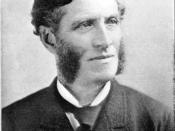Our lives are forever changing. We will always have doubts about our faith and lives (Guzman). In "Dover Beach" the speaker, Matthew Arnold expresses many doubts about the world and about how faith seems to disappear. Arnold uses the sea as a universal symbol to reflect his doubts in faith. Arnold begins the poem in a happy mood, calling his lover to her window "Come to the window, sweet is the night air" (Dover 6)! The author's or is it the reader? happy mood slowly dwindles into sadness and finally despair "Nor certitude, nor peace, nor help for pain" (37).
For more than two millennia, humanity has contemplated immensity-- the heavens, the ocean--and felt both the grandeur and insignificance of individual life. Whereas the heavens usually inspire awe and fairy tales, the ocean invites wanderlust, melancholic yearning and a subtle, sometimes Romantic, terror. When Matthew Arnold stood at a window with his love, gazing out over the calm waters of the English Channel, the moonlit view offered no solace (Dove).
Throughout the poem, the sea is used as an image and a metaphor. At first, it is beautiful to look at in the moonlight (1-8), then it begins to make hostile sounds ("grating roar" (9); "tremulous cadence" (13)) that evoked a general feeling of sadness. "In the third stanza, the sea is turned into a metaphoric 'Sea of Faith' (21) a symbol for a time when religion could still be experienced without the doubts brought about by progress and science"(Touche). In "Dover Beach," the sea is quite ambivalent, appearing beautiful on the outside but then being turned into a metaphor for the loss of religion and certainty. "Dover Beach" portrays a night scene at the seaside. The poet projects his negative feeling on the...


